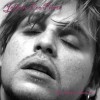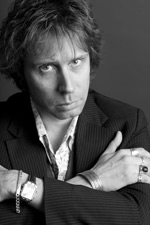Despite the undeniable influence the music of Jeffrey Lee Pierce has had on my own, to be honest when I first heard the Gun Club I wouldn’t have predicted this to be the case. People who know about my band, the Chrome Cranks, know that the group was formed in Ohio, but actually until I was 17 I lived in a small town in New Jersey, about 30 minutes from New York City. So that’s where I was in 1981, when Fire of Love was just out and WNYU’s “New Afternoon Show” was playing the hell out of “Sex Beat” and “She’s Like Heroin to Me.” The drummer of my first band, Sand in the Face, bought the LP, hated it, and gave his copy to me. It’s warped and beat to hell, and I have it to this day. I dug the music but at the time it didn’t resonate with me as much that of the Bad Brains, Black Flag, the Circle Jerks, Minor Threat, and the other early hardcore gods; stuff that, as a bored, angst-and-hormone-ridden suburban teenager, I found more immediately gratifying.
There was too much going on with the Gun Club’s music for me then. It was scary: Just the spooky, Southern voodoo imagery of that first LP’s cover alone was enough to give this pre-pube wet nap a year of nightmares. This was music that spoke of the deepest, blackest recesses of the heart, of the dark mind’s murky, uncharted nether regions. Shakespeare. Brecht. Cormac McCarthy. Ingmar Bergman. Erskine Caldwell. Baudelaire. Orson Welles. Cheating women. Cheating on women. Guilt. Death. Desperation. Things that I, being a pampered and cuddly young pup, had yet to experience.
And so it wouldn’t be until a few years later, after I’d done some livin’ on my own—and discovered the blues of Blind Lemon Jefferson, Howlin’ Wolf, John Lee Hooker, Robert Johnson, Elmore James—that Pierce’s music would really register. And when it did, oh boy did it. Like a brick house in a tornado. Not only did the profound breadth and boundless depth of the Gun Club’s music become so overpoweringly apparent and hopelessly transfixing, but for me Jeffrey Lee became an almost mythic figure, the gate-keeping mystic of Route 666 itself. I was obsessed. Had to have everything the man did.
I saw the Gun Club four times, once in Cincinnati when I lived there, twice in Boston when I was in college, and once in New York after I’d moved there and the Cranks were starting to happen. In keeping with the group’s legend, to say those gigs were inconsistent would be an understatement. But it was the unpredictability—plus my constant spinning of the records at home—that somehow kept me coming back for more. At one gig at the Rat in Boston the obviously tripping Pierce had to be literally installed in front of the mic, Syd Barrett-style, before the band could start the show—which lasted about three songs before guitarist Kid Congo Powers and bassist Patricia Morrison sat down on the drum riser and gave up. A few months later, however, and the quartet was back in town during the tour for The Las Vegas Story, churning through a white-hot set that saw a detached, spectral Pierce conjuring the epic Americana-gone-wrong of Allen Ginsberg’s Howl. The difference between the two performances was startling, to say the least.
At the1995 show at Wetlands in New York I finally got to meet the man, who was recently clean and, I had heard, even on a macrobiotic diet. I gave him a copy of “Darkroom,” our second single, which had just come out, and told him about the profound influence the Gun Club had had on the Cranks’ sound. He was friendly and well spoken and seemed genuinely touched—and promptly dropped the record on the floor as he tried to juggle it with some guitar cords and other stuff he was carrying at the time. Even then I thought that this was hilarious and somehow poetically perfect: A long-awaited brush with greatness ends on a sticky nightclub floor.
Not long after that I got to know and become friends with Kid Congo Powers, one of the sweetest and most talented musicians ever, and one who would eventually do the Cranks the honor of playing “Jack on Fire” with us at one of our Manhattan dates. One evening I ran into him on the street and he told me that Pierce was moving to New York and had asked him to put together a new lineup of the Gun Club there to record an album and do some gigs. He then asked me if I’d like to be in the band. I just about fell on the sidewalk. It didn’t take me long to say yes, and I pretty much floated above the city for what seemed like weeks. Unfortunately Pierce died not long before he was to come to New York, and of course his passing was a sad and tragic loss to the entire music-loving universe, not just my own. But just being asked to be in the Gun Club ranks as one of the true high points of my life, and I’ll always cherish the invitation.
The intervening years have been hugely vindicating for Pierce’s later albums with the Gun Club and as a solo artist, gems like Mother Juno, Wildweed, and Pastoral Hide & Seek, which at the time were mistaken for mere artistic groping and pigeonhole-bucking but now with each listening reveal endless layers of richly rewarding creative maturity. But then what else should we expect? It’s just Jeffrey Lee Pierce, still ahead of the curve and having the last laugh. A darkly sinister laugh, of course.
—Peter Aaron, Saugerties, New York, 2009.








